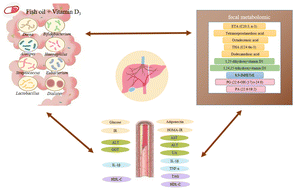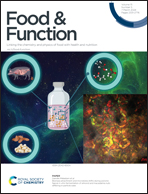Effects of dietary supplementation of fish oil plus vitamin D3 on gut microbiota and fecal metabolites, and their correlation with nonalcoholic fatty liver disease risk factors: a randomized controlled trial†
Abstract
We previously reported that fish oil plus vitamin D3 (FO + D) could ameliorate nonalcoholic fatty liver disease (NAFLD). However, it is unclear whether the beneficial effects of FO + D on NAFLD are associated with gut microbiota and fecal metabolites. In this study, we investigated the effects of dietary supplementation of FO + D on gut microbiota and fecal metabolites and their correlation with NAFLD risk factors. Methods: A total of 61 subjects were randomly divided into three groups: FO + D group (2.34 g day−1 of eicosatetraenoic acid (EPA) + docosahexaenoic acid (DHA) + 1680 IU vitamin D3), FO group (2.34 g day−1 of EPA + DHA), and corn oil (CO) group (1.70 g d−1 linoleic acid). Blood and fecal samples were collected at the baseline and day 90. Gut microbiota were analyzed through 16S rRNA PCR analysis, and fecal co-metabolites were determined via untargeted ultraperformance liquid chromatography–quadrupole time-of-flight mass spectrometry (UPLC-Q-TOF-MS). Results: The relative abundance of Eubacterium (p = 0.03) and Lactobacillus (p = 0.05) increased, whereas that of Streptococcus (p = 0.02) and Dialister (p = 0.04) decreased in the FO + D group compared with the CO group. Besides, changes in tetracosahexaenoic acid (THA, C24:6 n-3) (p = 0.03) levels were significantly enhanced, whereas 8,9-DiHETrE levels (p < 0.05) were reduced in the FO + D group compared with the CO group. The changes in 1,25-dihydroxyvitamin D3 levels in the fecal samples were inversely associated with insulin resistance, which was determined using the homeostatic model assessment model (HOMA-IR, r = −0.29, p = 0.02), and changes in 8,9-DiHETrE levels were positively associated with adiponectin levels (r = −0.43, p < 0.05). Conclusion: The present results indicate that the beneficial effects of FO + D on NAFLD may be partially attributed to the impact on gut microbiota and fecal metabolites.



 Please wait while we load your content...
Please wait while we load your content...